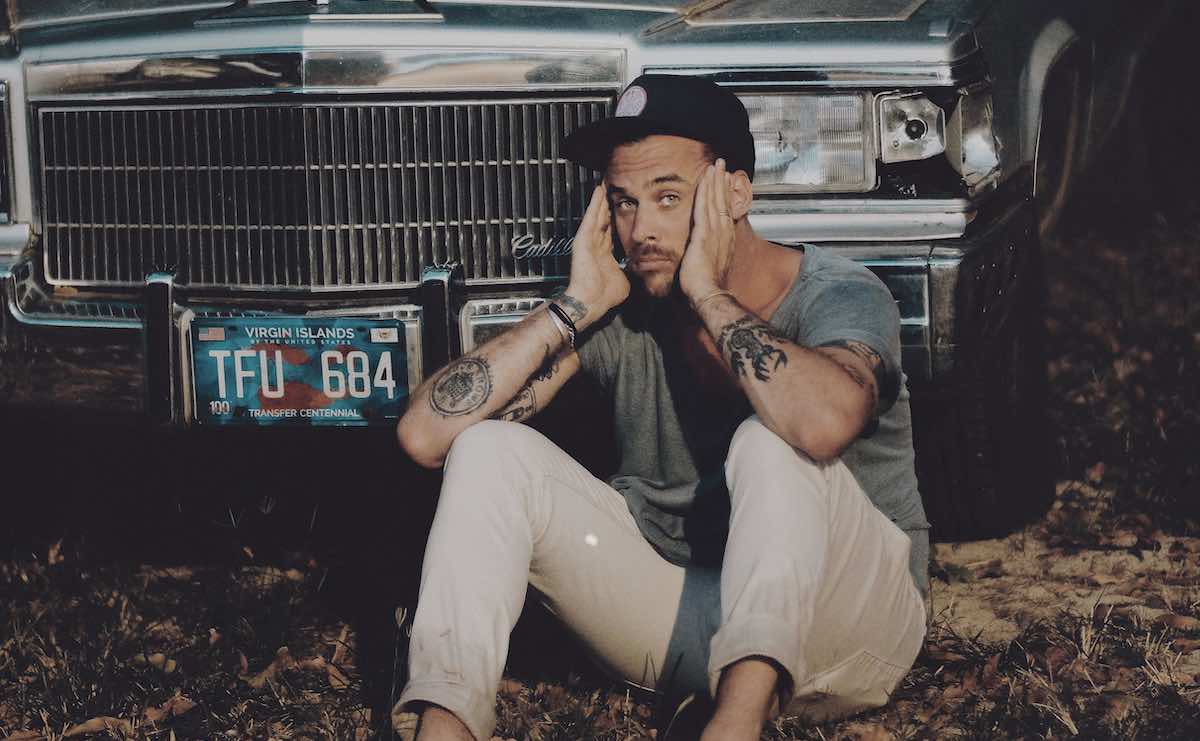
Pete Lawrie Winfield (aka Until The Ribbon Breaks) on Tuesday released his new song "Red Skies," the second new release following the thunderous "Everything Else But Rain," which arrived in April and was Variance's Big Obsession selection.
The song was recorded and crafted in a series of spontaneous moments, both at the Joshua Tree studio Escape and in Bogotá, Colombia, featuring contributions from rising Colombian star La Pardo. The track is accompanied by a moody set of visuals, which are also out today.
"Of all the songs I think I've ever made, it definitely has the most—geographical or logistically—the most interesting story, in terms of everyone involved," says Winfield, speaking with Variance ahead of the song's release. "And luckily we filmed all of this because sometimes when I say it out loud, it sounds so ridiculous ... But a snake showed up at the door of the session. And I mean, like a large rattlesnake, angry and hissing and rattling. And the first thing we did is recorded it. And it ended up being this incredible percussion sound."
Fortunately, a groundskeeper named Julio arrived and safely returned the snake to the wild, but Winfield was so marveled by his life's story that he asked Julio to contribute to the song in form of a spoken verse in Spanish.
This uptick in new music comes as Winfield is prepping a new Until The Ribbon Breaks album, which is expected later this year. He also co-wrote and produced Oklahoma artist and label mate Thunder Jackson's self-titled 2020 album, and he was recently back in Oklahoma working with Jackson again.
While fans are surely excited for new music from Winfield, he admits he wasn't sure if he would return to this project after struggling with addiction and his own mental health over the years. He confesses he had quietly "retired" the Until The Ribbon Breaks project. That is, until "Everything Else But Rain" came about, and he quickly realized this was the start of his next chapter.
"The first two albums, I think part of the issue was that I was talking about how I was feeling but outwardly acting a completely different way," explains Winfield. "I think I was trying to communicate in some, even subconsciously, that I was struggling on those first two records, maybe even to myself. And the reason I thought that project was done was for my mental health."
He continues: "The second record, in particular, was caught up in the tail end of my addiction and then into getting sober. And the distance in between that record and now has been a lot of personal growth and work, be that through therapy or in Alcoholics Anonymous. So, actually, to be able to express my feelings and being comfortable in that vulnerability, is a massive relief, honestly. It kind of takes the anxiety away rather than making me more anxious because I'm saying, 'Well, here it is. Take it or leave it.' I'm not hiding and I'm not anxious because I'm hiding. So it feels easier to be that honest."
Winfield says he began working on this new music, like many artists did, during the pandemic, when he was alone with his instruments and himself, rediscovering his love for music from the early years before he was known professionally. He says during that time, he was not only able to reignite his musical passion, but he also nurtured his own spirit. And for all the complexities of the Covid years, he believes more people have come to appreciate and perhaps understand the importance of self-care and mental health awareness.
"I think we are arriving at a much better place," he says. "It's easy to be cynical sometimes about these things and kind of say, the music industry, this and that, and it's true. To some degree, entertainment as an industry—there's no doubt that it's easier to hide inside of it. If you take music, for example, you can show up whilst on tour, you can show up to a venue and be drinking essentially at work and no one's going to raise an eyebrow. That's not necessarily as easy in other jobs, you know. But what I will say is, I think that there's much more of an openness to the discourse about it. And I think that's nothing but good."
Says Winfield: "You see the statistics about mental health and how much a lack of communication and feeling like you can talk to someone about it or admit what you're going through, [and it] is a huge part of what causes people to act on their mental illnesses, whether that's substance abuse or things like suicide. It often results in not feeling like you can communicate, and I do think it's getting better. I do think there's more awareness about it. I think the times have changed, thankfully, and the kind of historical, stereotypical idea of a quote-unquote 'rock star' is a bit antiquated now. And I think that's good. Accountability and responsibility, no doubt, are good things for mental health."
Winfield's struggle and recovery and subsequent openness about it is also a reminder of the human element of music in the midst of the ongoing debates and questions surrounding technology, most recently with AI and the fears it might outpace or replace artists, something Winfield says he's curious about while admitting he remains hopeful in spite of the hysteria.
"I'm constantly trying to listen to and read as much information, just out of curiosity," he says, while noting: "I don't tend to subscribe to doom-thinking in terms of the future of creativity and art because, if you go down that rabbit hole, that's where you're gonna stay. I just think the horizon line just has to be, assume, hope and act as if the human input is always going to be what sets art apart from everything else."
He adds: "Throughout history, we have these moments of mass panic ... And I go down that wormhole of watching all the debates about AI and the potential destruction. But sometimes I just think, 'Or I could just make something cool today.' You know, it's about trying to stay present as much as possible. We don't know. I don't know. Nobody knows. I can only control what I can control in this present moment."■












